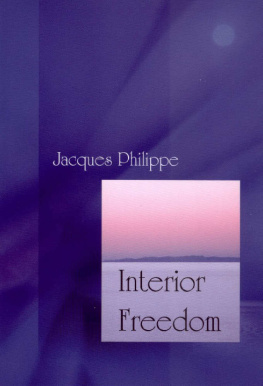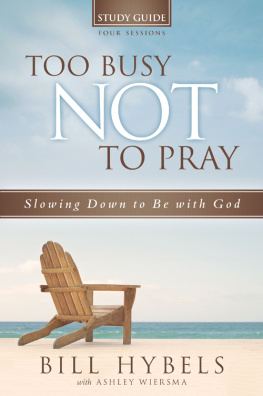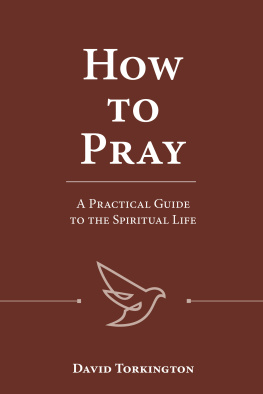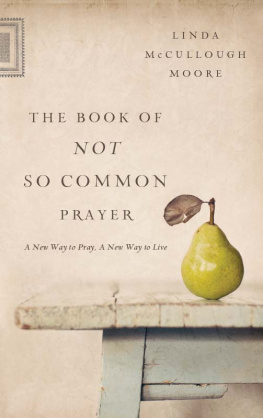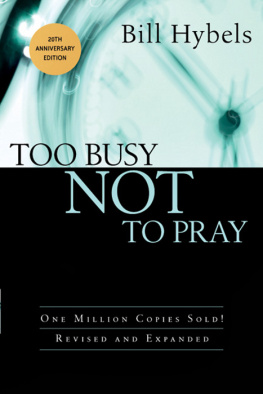Time For God
A Guide To Mental Prayer
Jacques Philippe
Translated by Helena Scott
Scepter Publishers, Inc.
www.scepterpublishers.org
Originally published as Du Temps pour Dieu
Copyright 1992, Editions des Beatitudes, S.O.C.
Burtin, France
Scripture texts from the New and Old Testaments are taken from The Holy Bible Revised Standard Version Catholic Edition, 1965 and 1966 by the Division of Christian Education of the National Council of the Churches of Christ in the United States.All rights reserved. All copyrighted material is used by permission of the copyright owner. No part of it may be reproduced without permission in writing from the copyright owner.
English translation copyright 2008
Scepter Publishers, Inc.
P.O. Box 211, New York, N.Y. 10018
www.scepterpublishers.org
All rights reserved.
Fourth Printing / September 2009
ISBN 978-1-59417-066-9
eBook ISBN: 978-1-59417-097-3
PRINTED IN THE UNITED STATES OF AMERICA
Contents
In the Western Catholic tradition the term prayer covers many different activities. The following pages mainly concentrate on mental prayer: prayer that consists of facing God in solitude and silence for a time in order to enter into intimate, loving communion with him. Practicing this kind of prayer regularly is considered by all spiritual masters to be a privileged, indispensable path that gives access to genuine Christian lifea path to knowing and loving God that empowers us to respond to his call to holiness addressed to each individual.
It is a wonderful fact that many people today are thirsty for God and feel a desire for that sort of intense, personal prayer life; they would like to be able to spend time praying as a regular thing. But they encounter obstacles that prevent them from following the path seriously, and especially from persevering on it. Sometimes they dont receive the encouragement needed to make up their minds to begin, or else they feel helpless because they simply dont know how to start. Sometimes, after repeated attempts, they become discouraged by the difficulties and abandon the regular practice of mental prayer. Its a pity, because perseverance in mental prayer, according to the unanimous testimony of all the saints, is the narrow gate that opens the Kingdom of Heaven to us; it is the only way for us to receive the gifts which no eye has seen, nor ear heard, nor the heart of man conceived, what God has prepared for those who love him (1 Cor 2:9). Mental prayer is the source of true happiness. Whoever practices it faithfully will not fail to taste and see that the Lord is good (Ps 34). Those who pray will find the living water that Jesus promised: Whoever drinks of the water that I shall give him will never thirst (Jn 4:14).
Convinced of this truth as I am, my aim in this book is to provide advice and orientation and do that as simply and specifically as possible. I hope this may help everyone who has goodwill and a desire for mental prayer to set out and persevere on the path of prayer, without being overcome by the inevitable difficulties.
There are plenty of books about mental prayer. The great contemplatives have spoken about it much better than I can, and I will quote them frequently. Nevertheless, it seems to me that todays believers need a presentation of the Churchs traditional teaching that is simple and easily accessible, adapted to todays outlook and expressed in todays language. Such a presentation also needs to take account of the pedagogy that God in his wisdom is using today to lead souls to holiness; it is not always the same as in past centuries. These, then, are the reasons which moved me to write this book.
To persevere in a life of prayer we obviously need to avoid heading down the wrong road at the start. Thus we need to determine what is specific to Christian prayerwhat distinguishes it from other activities of the spirit. This is all the more important since we may react against the materialistic culture around us by developing a sort of thirst for the absolute, for mysticism and communion with the unseen. Such is a good in itself, but it can easily lead one to deceptive and even harmful experiences.
The first, basic truth, without which we will not get very far, is that the life of prayer (or contemplative prayer, to use a different name for the same thing), is not the result of a technique, but a gift we receive. St. Jane Frances de Chantal used to say, The best method of prayer is not to have one, because prayer is not obtained by artificeby technique, we would say todaybut by grace. There is no method of praying, in the sense of a set of instructions or procedures that we merely have to apply in order to pray well. Though true contemplative prayer is a gift that God gives freely, we do need to understand how to receive it.
This point needs to be stressed for several reasons. First, of course, Eastern meditation methodsyoga, Zen, etc. are widely known in todays world. Moreover, the modern mindset wants to reduce everything to a technique. And third, the human mind is forever tempted to try to make life, including spiritual life, into something to be manipulated at will. For all these reasons we often have, consciously or unconsciously, a false image of contemplative prayer as a sort of Christian yoga. We imagine that set procedures of mental concentration and recollection, appropriate breathing techniques, prescribed physical positions, the repetition of certain formulas, and so on should cause us to progress in mental prayer. When thoroughly mastered through practice, we believe, these things should enable one to attain a higher state of consciousness. But this view gives a completely false picture of mental prayer and the mystical life in Christianity.
It is false because it leads us to cling to methods that depend ultimately on human effort, whereas in fact, as Christianity sees it, everything is grace, a free gift from God. True, there may be a certain resemblance between Eastern ascetics or holy men and Christian contemplatives, but the resemblance is superficial. At bottom they inhabit very different, even incompatible, realms.
The essential difference has been pointed out. On the one hand, it all comes down to technique, an activity depending essentially on human beings and their capabilities. This is so even when such systems claim to invoke special capabilities, left unused by ordinary mortals, which the meditation technique in question proposes to reveal and develop. On the other hand, by contrast, it is a matter of God giving himself freely to someone. Even if, as we shall see, there is room for a certain amount of initiative and activity on the human side, the whole edifice of the life of prayer is built on Gods initiative and his grace. We must never lose sight of this fact, for one of the permanent and sometimes subtle temptations of the spiritual life is to rely on our efforts and not on Gods freely given mercy.
There are many very important consequences to what has just been said. Lets look more closely at a few.
The first consequence is that, even though methods or exercises can be helpful in mental prayer, we should not attach too much importance to them, much less imagine that everything depends on them. To do that would mean centering the life of prayer on ourselves instead of God, and that is just the mistake we must avoid. Nor should we imagine that all we need is a bit of practice, or learning certain tricks, and then all our difficulties, distractions, etc., in prayer will vanish. The profound logic of growth and progress in the spiritual life belongs to a totally different order. And that is just as well, for if the edifice of prayer had to be built up on our efforts we wouldnt get very far. St. Teresa of Avila says the whole edifice of prayer is founded upon humilityon the conviction that of ourselves we can do nothing, and it is God, and he alone, who can produce good in our souls. Pride may make this idea distasteful to us, but in fact it is enormously liberating. God, who loves us, will carry us infinitely further and higher than we could ever get on our own steam.
Next page



